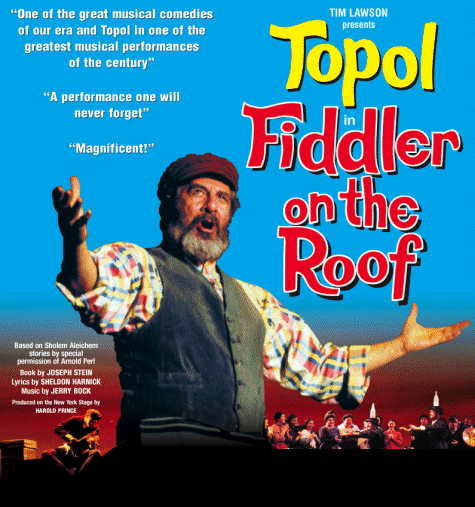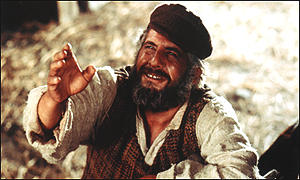Recently I’ve been watching quite a few Broadway musicals to see elements that I like and dislike in each. My co-workers have enjoyed very much watching me go into video stores in China and say “Excuse me, where are you musicals?” And everytime they bring me CD’s of Western pop artists. In fact, a local guide has told me there is no way to explain “Broadway musical” to a video shop owner here in China – they don’t understand what it is.
So my friends say “Broadway musicals? Why don’t you ask them where the Barbara Streisand section is?” Yeah, very funny guys. I’ve got a friend back home who says “I hate musicals. They don’t make any sense. I like plays, they’re more real.” Then he asks me, “Do you like musicals?” And my reply is, “I HAVE to like musicals. After all, I’m a musician, I need to work!” But truth is, I love the cheeziness of musicals. I think it’s a kick.
So I spend hours hunting – and most of my finds are the moldy oldies – like “Fiddler on the Roof”. I watched the movie version with Topol as Tevye. This isn’t a scholarly dissection here; just a list of what struck me as good elements. Just as a regular viewer.
MOTIVES
- Right at the top Tevye exlains Anatevkah and what it is. A place on a precarious perch held together by tradition, like a “Fiddler on the Roof”.
- We find out Tevye dreams of being rich, but it’s presented in a way that we know he will never be financially rich. It endears us to his character later when he let’s his daughters be poor in exchange for being in love and marrying who they choose. In time, each daughter moves further away from tradition in their choices. We are proud of Tevye, and also sad for him as he watches his life disintegrate.
- I enjoy the “freeze frame” moments when Tevye talks to God. All characters freeze, and he talks to God in first person. His very famous “on the other hand” comments too.
- Much of Tevye’s character development is done by other character’s comments and actions around him. Like when the tailor is nervous to talk to him, and how the daughters early on submit to his word. These highlight the theme of tradition too. This follows the rule in character development of “don’t tell us, show us!”
- Once the characters are in place with a few scenese of getting what they want, and after we have grown to love them a bit – there is the very fun dance scene in the bar. Tevye is finally “happy” – and then comes the warning of an upcoming military demonstration. This sets up the main antagonist point to come later. It was a great mood change – and let the audience know “ok, this play is really going to be about something later.”
- All the characters are very transparent in what they want. The daughters want true love, the suitors want true love too, the military captain wants to do right but has a job to do, the butcher is rich but wants love, Tevye has love but wants money (or does he really). The characters are crystal clear in their motives, is that a good thing?
SONG PLACEMENT
- Maybe it is only the movie version, and not the actual stage play – but the song placement usually surprised me. Kind of came in quick where I didn’t expect it. It just went into the songs without a line that would say “Now I’m going to sing a song” – I liked that.
- Most song placements in musicals happen at a time of heightened emotion. A point that “demands a song” – Fiddler on the Roof follows this rule to a T.
- Some of the themes introduced early on are repeated later in the play – like the melody of “if I were a rich man”. Not quite leitmotifs, but definetely gave a feeling of consistency.
- I like some of the orchestration in fidller; most notably the intimate solo fiddle passages in scenes with Tevye, and also the large orchestration of the dance numbers and the song “Tradition”. Brass, timpani – full shebang – I dig that.
TOPOL’S COMMENTS ON FIDDLER
“There is something for everyone in this film,” he purrs. “After 25 years, all married couples will question whether they are still in love.
“Children will always think they know better than their parents.
“And the film is particularly popular with girls in Japan because they identify with the conflicts that can be caused by arranged marriages.”



OK – this is weird. I continued to check out your website. Our school is presenting Fiddler on the Roof next spring. Are we kindred spirits???? Would appreciate your thoughts on this production.
Julie Chapman
My thoughts on Fiddler on the Roof regarding presentation are not tremendously deep: Do it like the movie with Topol. That’s what people want to see. And if the drama students say that’s not learning the craft of acting; you can inform them that the harsh reality is that if they become professional actors, a large portion of their work will be mimicry. That is, if they want to eat. If you’re going to redo something, then redo the entire thing; but there are probably better plots to do that with than Fiddler On The Roof. Even though Fiddler is technically in the “oldy moldy” category now – who doesn’t love seeing it?